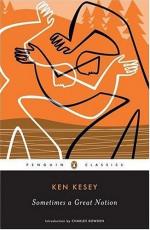|
This section contains 124 words (approx. 1 page at 400 words per page) |

|
Ken Kesey's friend Ken Babbs once remarked, "A man should have the right to be as big as he feels it's in him to be." So taken was Kesey with Babbs's comment that he quoted it in Sometimes a Great Notion. Babbs's observation reveals the novel's primary social concern: that self-reliance must not be destroyed by a collectivist force, in this case a logging union. In the Emersonian tradition, Kesey advocates rebellion against pressures to conform.
Evoking his favorite mythic hero, the cowboy, Kesey creates first in Henry Stamper, then in his son Hank, and ultimately in his younger son Lee the frontier blend of independence, courage, irrepressible determination, and ardent defense of personal freedom that the writer so admires.
|
This section contains 124 words (approx. 1 page at 400 words per page) |

|




